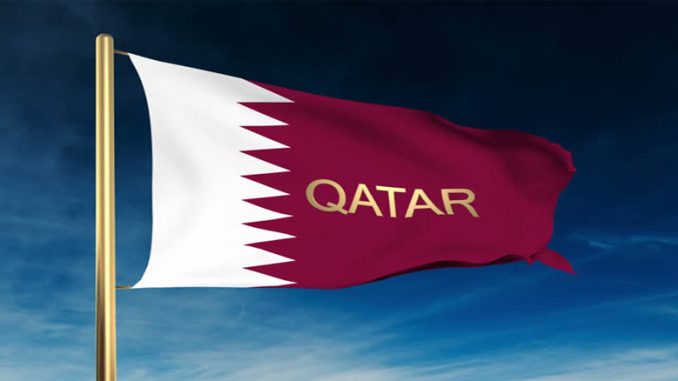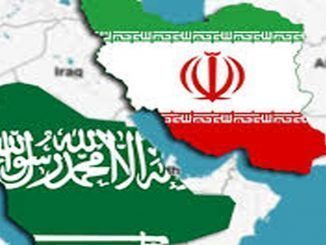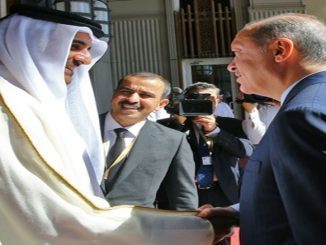
A number of Arab nations cut off relations with Qatar on Monday morning, accusing it of ‘sponsoring terrorism’.
The United Arab Emirates, Saudi Arabia, Bahrain, Yemen and Gen. Khalifa Haftar in Libya all cut off diplomatic contacts with Qatar on Monday morning, after officially accusing the Gulf state of “sponsoring terrorism”.
In what appears to be a coordinated move, foreign office officials claimed Qatar was responsible for supporting the Islamic State group and al-Qaeda “at all levels” in an unprecedented diplomatic spat for the Gulf region.
The land border with Saudi Arabia has also reportedly been sealed.
In a tweet sent out early on Monday morning, the Saudi Ministry of Foreign Affairs said: “Protecting national security from threats of terrorism and extremism, Saudi Arabia has decided to sever diplomatic and consular relations with the State of Qatar.”
In a statement published by Qatar’s foreign ministry, authorities said the decision, which it says was clearly pre-meditated, “is based on baseless fabricated claims.”
“Qatar has been the target of a systematic incitement campaign that promoted outright lies which indicates that there was a prior intent to harm the state,” the statement said.
Riyadh announced on state television that Qatar would no longer participate in the Saudi-led coalition in Yemen, claiming Doha had helped support its enemy, al-Qaeda in the Arabian Peninsula. The Saudi-led campaign in Yemen’s war has mostly targeted Iran-backed Houthi rebels, who are supported by Yemen’s ousted president, Ali Abdullah Saleh.
Saudi Arabia was the first country to break off relations at just after 3.30am GMT, followed shortly by Bahrain, Egypt and the UAE.
Riyadh also announced closures to Qatar’s only land border – with Saudi Arabia – and gave diplomatic staff 48 hours to leave the country.
The UAE also announced its citizens would no longer be allowed to visit Doha.
UAE state media agency said the Emirates “regretted Qatar’s policies had driven a wedge between them”, but confirmed its “respect and appreciation to our brother people”.
Monday’s diplomatic incident is the latest in a series of events related to Saudi Arabia’s opposition to Qatar’s alleged support for the Muslim Brotherhood.
The Saudi foreign minister, Adel al-Jubeir, held talks with his Egyptian counterpart in Cairo on Sunday, discussing a joint approach to fighting regional terrorism.
The two ministers said they had “full compatibility of views”.
Qatar denounces the ‘unjustified and pre-planned’ Gulf diplomatic attack
In a statement published on Monday, Qatar’s foreign ministry said it regrets a recent decision by a number of Arab nations, including Saudi Arabia, to cut diplomatic ties with Doha.
Qatari authorities expressed “great surprise” over what it described as the recent unjustified developments in the region, after a number of nations – including Saudi Arabia, the United Arab Emirates, Bahrain and Egypt – suspended diplomatic ties with Doha over accusations of “sponsoring terrorism”.
In a statement published by Qatar’s foreign ministry, authorities said the decision, which it claims was clearly pre-meditated, “is based on baseless fabricated claims”.
“Qatar has been the target of a systematic incitement campaign that promoted outright lies, which indicates that there was a prior intent to harm the state,” the statement said.
Doha reaffirmed its dedication to the Gulf Co-operation Council and said it respected the sovereignty of all other member states and has not interfered in their “internal affairs”, as has been alleged.
“Qatar is also dedicated to its obligation in the war on terrorism and extremism. It is clear that the media campaign against Qatar has failed, especially in Gulf nations, which explains this escalation,” it said, adding, “the fabrication” of a media crisis used to increase pressure against it is evidence that there are “no legitimate causes to take the decision to cut ties”.
“The goal is clear, enforcing guardianship over our country which is a blatant violation of our sovereignty, which is completely unacceptable. The statement released by the three GCC nations makes it clear that the relentless fabricated media campaign against Qatar was pre-planned.”
Saudi Arabia, the UAE, Egypt and Bahrain all cut off diplomatic contact with Qatar on Monday morning, after officially accusing it of “sponsoring terrorism”.
In what appears to be a coordinated move, foreign office officials claimed Qatar was responsible for supporting the Islamic State group and al-Qaeda “at all levels” in an unprecedented diplomatic spat for the Gulf region.
Just hours after the escalation, Yemen also announced its severance of ties with Doha after “Qatar’s practices of dealing with the [Houthi] coup militias and supporting extremist groups became clear”, a government official said in a statement.
It added that Yemen supported a decision by the Saudi-led coalition to remove Qatar from its ranks after more than two years of fighting Houthi rebels in the country.
‘No impact on fight against terror’
Meanwhile, US Secretary of State Rex Tillerson and Defense Secretary Jim Mattis responded to the developments saying the move would not affect the fight against terrorism in the region and urged the nations involved to address their differences.
“I do not expect that this will have any significant impact, if any impact at all, on the unified – the unified – fight against terrorism in the region or globally,” Tillerson said on Monday.
Qatar has a land border with Saudi Arabia, and is separated by Gulf waters from nearby Bahrain and the United Arab Emirates.
Riyadh has closed the border with Qatar, giving diplomatic staff 48 hours to leave the country. A significant proportion of Qatar’s food supplies has for years been imported over the Saudi border.
However, Doha insisted the sanctions, which include the Gulf states severing air, land and sea links with Qatar, “will not affect the daily life of citizens and residents”.
“The Qatari government will take all measures necessary… to foil attempts to affect or harm Qatar’s society and economy,” the statement said.



